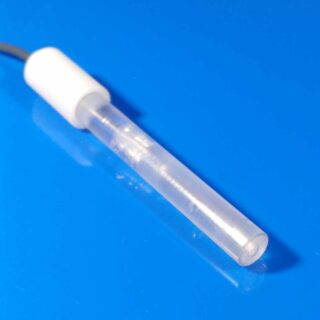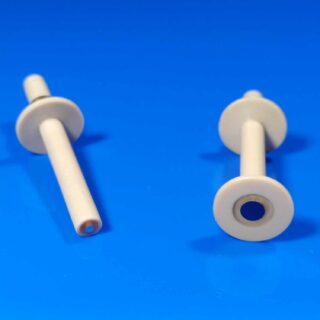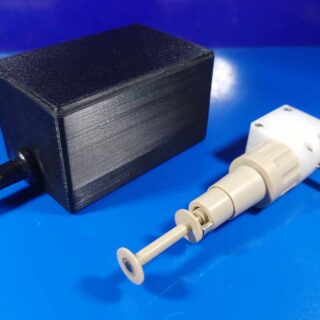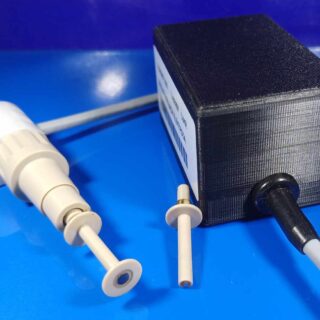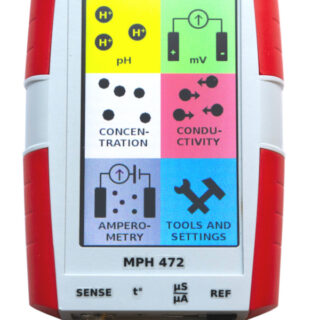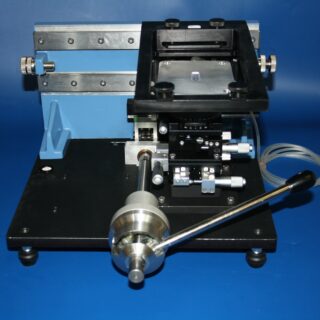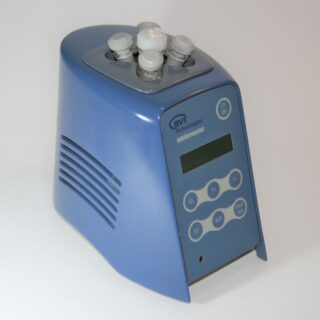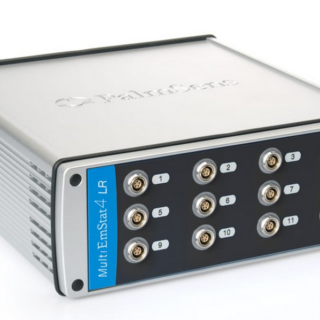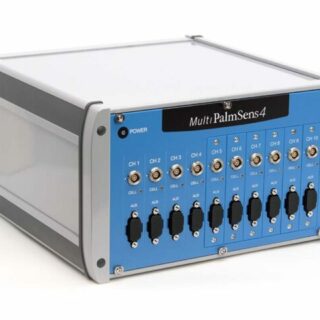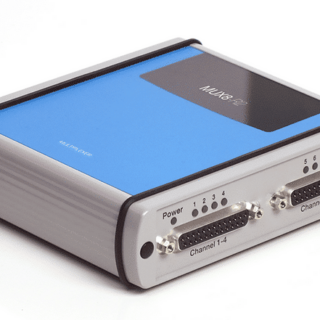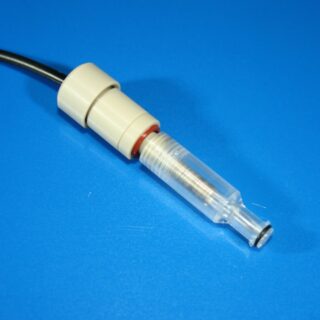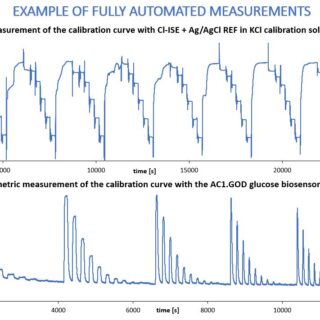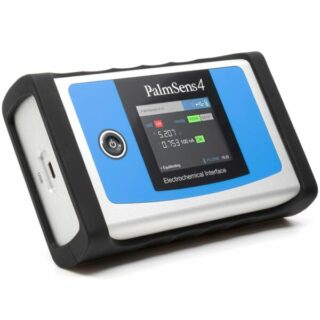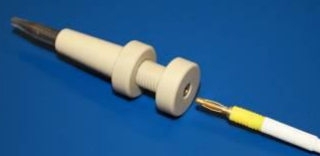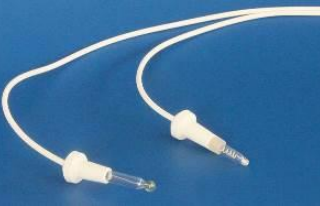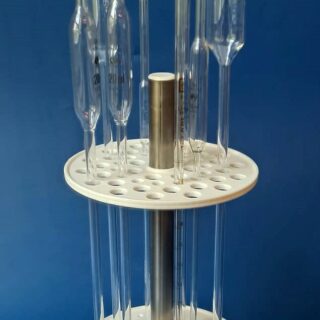Category
- Custom made glass products
- CUSTOMER SERVICES
- NEW PRODUCTS
- Sensors and electrodes
- Custom made and Modified Screen Printed Electrodes
- Stirrers
- Cables and connectors
- Cell
- Potentiostats
- Manual Screen Printer
- Minithermostat
- Pumps
- Accessories
- Kits & Sets
- Discounted SPEs (at a reduced price with visual defects/inconsistancies, but fully functional)
Archives: Products
Showing 81–96 of 127 results
-
Mini RCE.GEL.L60.C1 Miniature reference argentochloride gel electrode
Read moreMiniature reference argentochloride gel electrode is designed for potentiometric measurements in connection with Miniature ion selective electrodes for potentiometric measurements of Chloride ions, Sodium ions, Calcium and Potassium ions concentration in aqueous solutions following prior calibration.
The conductive connection of the internal electrolyte (KCl gel) enclosed in a plastic tube is mediated by a porous frit.
Maintenance-free electrode – no need to top up the internal electrolyte (KCl gel).
Electrodes are applicable to all commonly used measuring apparatus, with input resistance of at least 1012 Ω.
Possibility of integration with a FC.1ISE.1REF Flow cell for single ion selective electrode with integrated stirring – possible automation and continuous measurement.
-
Mini RDE tips
Read moreMini rotating disc electrode tips
BVT provides a wide range of RDE tips, composed from different materials from gold, platinum and copper to glassy carbon and working electrode diameters from 2 to 5 mm.
The electrode material is inserted into a body of the Rotating disk electrode (RDE) to ensure excellent chemical compatibility and mechanical integrity.
-
Mini Rotating Disk Electrode
Read moreThe Mini Rotating disk electrode (Mini RDE) in general enables defined mass transfer towards electrode surface.
The Mini RDE consists of the body of the RDE (motor) with 6 pcs of interchangeable electrode tips.
The device is equipped by control electronics and SW and powered by USB connection with PC.
Rotational speed of Mini RDE is 10 – 1300 rpm.RDE is suitable for measurements in glass cells of type TC4, TC5, TC6 and TC7. During measuring with RDE
in a classic three-electrode connection, it is advisable to use a classic reference RCEc.R* and auxiliary electrode ACEc.* For this product, we recommend our customers use the Training Service from BVT.
(https://bvt.cz/produkt/offer-of-long-term-automated-measurements-on-bvt-apparatus/)
-
Mini Rotating Disk Electrode Kit
Read moreThe Mini Rotating disk electrode (RDE) in general enables defined mass transfer towards electrode surface.
The Mini RDE consists of the body of the RDE (motor) with 6 pcs of interchangeable electrode tips for RDE. The device is equipped by control electronics and SW and powered by USB connection with PC. Rotational speed of Mini RDE is 10 – 1300 rpm.
The Kit also includes:
- TC4 electrochemical glass cell, which openings are suitable for included connector KA1.C.S
- 20 pcs of Screen printed sensors (type AC1., AC2., AC4.)
- classical reference electrode RCEc.
During measuring with Mini RDE in a classic three-electrode connection, it is also advisable to use the classical auxiliary electrode ACEc.
* For this product, we recommend our customers use the Training Service from BVT.
(https://bvt.cz/produkt/offer-of-long-term-automated-measurements-on-bvt-apparatus/)
-
MPH 472 Universal Potentiostat
Read moreThe instrument enables measurement of amperometry, potentiometry and conductometry. Communication with the computer is provided via USB or Bluetooth. This hand-held device is equipped with GPS navigation so the measured data may be enhanced by the exact coordinates of the location where the measurement was made.
Measured data can be stored and later processed in a PC because of the SD card slot incorporation. The ability to record a waveforms or integrate the measure values is enabled. Basic evaluation methods are also implemented – linear and non-linear calibration and standard addition method is available. The influence of the type of oxygen electrode membrane, temperature or gas solubility can be compensated for the measured values.
The measured data are automatically recalculated and displayed in units of current, voltage, concentration (g∙L-1 or mol∙L-1) or saturation. Potentiometric measurement allows connection of pH electrodes and ISE.
Key Properties
- Up to 200 hours of battery life depending on the operating mode.
- Excellent analytical tools (graphs, unit conversions, internal standard method for potentiometry, coulometric titration, 10 Henry’s constants for various redox active gases).
- Power supply and data communication via USB, possibility of connection via Bluetooth.
- Data logging to memory card.
- Up to 5-point calibration for ISE and pH electrodes.
- Up to 4-point calibration of the conductivity cell makes it possible to compensate the non-linearity of the measurement.
- GPS equipment enables measurements in the field with location storage.
- Calibration stored separately in the device (possibility of changing the memory card without having to recalibrate the device).
- Possibility of separate calibration for 4 probes for amperometry and potentiometry.
- The possibility of using different temperature sensors (PT100, PT1000, Ni1000, ATC Monocrystals).
- Advanced power management (display sleep and automatic device shutdown can be set according to the user’s preferences
- Vector voltmeter for accurate conductivity measurement.
- Powerful thirty-two-bit microprocessor for accurate measurement calculations.
Improvements:
- Faster battery charging via USB charger.
- Vector voltmeter for precise conductometric measurement.
- A more sensitive GPS module.
- More robust input circuits for ametrometric measurement – less susceptible to noise.
More information can be found through the link: https://www.monokrystaly.cz/cs/ph-mv-ion-metry.html?fbclid=IwAR3ieir-mH-D10LZ-SZkrx74OHZYvOHjZPnOX8nfi9WdcwostsUgTAVaZPM#MPH471
-
MSP Manual Screen Printer
Read moreThe manual screen printer is useful for applying of biochemical paste on electrochemical sensors. It may be used for preparing customer design electrochemical sensors also.
It uses extremely small quantities of printing material. With the adjustment of the distance between the screen and the substrate the thickness of the printed elements can be varied. Under optimal conditions printing of lines with 200 µm can be achieved.
* For this product, we recommend our customers use the Training Service from BVT.
(https://bvt.cz/produkt/offer-of-long-term-automated-measurements-on-bvt-apparatus/)
-
MT-1 Minithermostat
Read moreTechnical Parameters
- Supply: 12 V
- Min temperature: -9.9°C
- Max temperature: 59.9 °C
- For TC4, TC6 or Eppendorf microvials
Device Usage
- Cooling/heating of solution of temperature sensitive chemicals during experiments
- Maintaining of chemicals at exact temperature
- The electrochemical measurement with thermodiffusion
- Heated electrodes technology
The option with Eppendorf microvials 0.2 ml, 0.5 ml, 1.5 ml is possible
Minithermostat device is designed for tempering an electrolytic bath for electrochemical measurements. The temperature is stabilized and the Peltier thermal element, which allows cool or warm the measured electrolytic samples.
-
MultiEmStat4
Read moreThe MultiEmStat4 is a compact Potentiostat, Galvanostat, and optional Frequency Response Analyser (FRA) for Electrochemical Impedance Spectroscopy (EIS) with 8 or 12 channels. The MultiEmStat4 comes in two versions; the Low Range version is great for applications that require a low current range down to 1 nA, whereas the High Range version is very suitable for applications that need a maximum current of 200 mA.
The MultiEmStat4 is controlled with MultiTrace for Windows, or you can write your own MethodSCRIPT and control it from any platform or operating system.
- Available with 8 or 12 channels
- FRA / EIS: 10 μHz up to 200 kHz
- Potential range: ±3 V (LR) or ±6 V (HR)
- Max. current: ±30 mA (LR) or ±200 mA (HR)
More information can be found through the link: https://www.palmsens.com/product/multi-emstat4/
Always a backup
The MultiEmStat4 is equipped with 500 MB internal storage memory on each channel for storing your measurements as a backup. All internally stored measurements can be browsed and transferred back to the PC easily using the MultiTrace software. Your data is always with your instrument wherever you take it.
Synchronizing channels in Synched mode
By enabling synchronization of channels and adjusting the setup of your cables, you can use the MultiEmStat4 as a polypotentiostat. This means you can use multiple working electrodes, one counter and one reference electrode in the same cell at the same time. Your working electrodes all perform the same measurement.
Specifications
The MultiEmStat4M is available in two versions: the LR (Low Range) and HR (High Range) version.
Main differences between the MultiEmStat4 Low and High Range 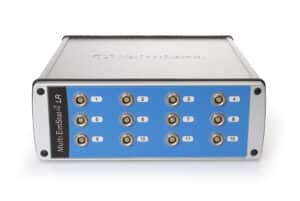
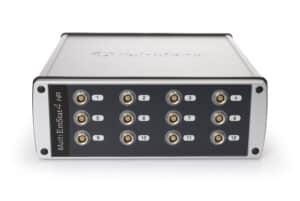


Potential range ±3 V ±6 V Max. compliance voltage ±5 V ±8 V Current ranges 1 nA to 10 mA (8 ranges) 100 nA to 100 mA (7 ranges) Max. current ±30 mA ±200 mA Electrode connections WE, RE, CE and ground,
2 mm banana plugsWE, RE, CE, Sense, and ground,
2 mm banana plugsHardware options - EIS up to 200 kHz
- Galvanic Isolation
- EIS up to 200 kHz
- Galvanic Isolation
-
MultiPalmSens4
Read moreMulti-channel Potentiostat / Galvanostat / Impedance Analyzer
- 4 to 10 channels available in different configurations
- FRA / EIS: 10 μHz up to 1 MHz
- 9 current ranges: 100 pA to 10 mA
- potential range: ±5 V or ±10 V
The MultiPalmSens4 is a flexible multi-channel potentiostat, galvanostat and impedance analyzer which you can fully tailor to your requirements and budget. The MultiTrace software allows for using each channel individually or simultaneously or running a sequence of automated tasks on each channel. Each channel provides an additional auxiliary port for controlling peripherals or monitoring temperature or other analog signals.
More information can be found through the link: https://www.palmsens.com/product/multipalmsens4/
Configure your ideal multi-channel potentiostat
Each channel can be configured with:
- ±5 V or ±10 V maximum potential range
- EIS/FRA with maximum frequency of 100 kHz or 1 MHz
- Bipotentiostat module for second WE
- iR-Compensation
- Galvanic isolation
Always a backup
Every channel of the MultiPalmSens4 is equipped with 8 GB storage space. This means all your measurements* can automatically be saved on-board as backup.
Measurements can be browsed and transferred to the PC easily using the MultiTrace software for Windows.Synchronizing channels in Synched mode
By enabling synchronization of channels and adjusting the setup of your cables, you can use the MultiPalmSens4 as a polypotentiostat. This means you can use multiple working electrodes, one counter and one reference electrode in the same cell at the same time. Your working electrodes all perform the same measurement.
-
MUX8-R2 Multiplexer
Read moreMultiplexer for 8 up to 128 cells
- Automatically switch between electrochemical cells
- Easy stacking with magnetic feet and top
- 4 different electrode or sensor configurations
- Daisy chain multiplexers, up to 128 channels!
The PalmSens series and the EmStat4X can be used to work with multiple working electrodes or a sensor array by means of a multiplexer.
The multiplexer switches between the working electrodes in the range of milliseconds.
- each MUX8-R2 multiplexer enables to work with up to eight 2- or 3- electrode systems.
- daisy chaining multiple MUX8-R2 boards (expansion up to 128 channels)
- all hardware settings are controlled by the software making it unnecessary to flick a physical switch
- LEDs to show which channel is selected
- allows to connect auxiliary input (like temperature sensor)
More information can be found through the link: https://www.palmsens.com/product/mux8-r2/
Connection options
The most selected connection option uses two double shielded D-Sub cables ending in 2 mm banana plugs. As alternatives we can provide a PCB with screw terminals, D-Sub cable ending in ferrules or Screen Printed Electrode Adapter. Each of these cables can be connected to 4 channels, if all 8 channels are used, two cables are needed.
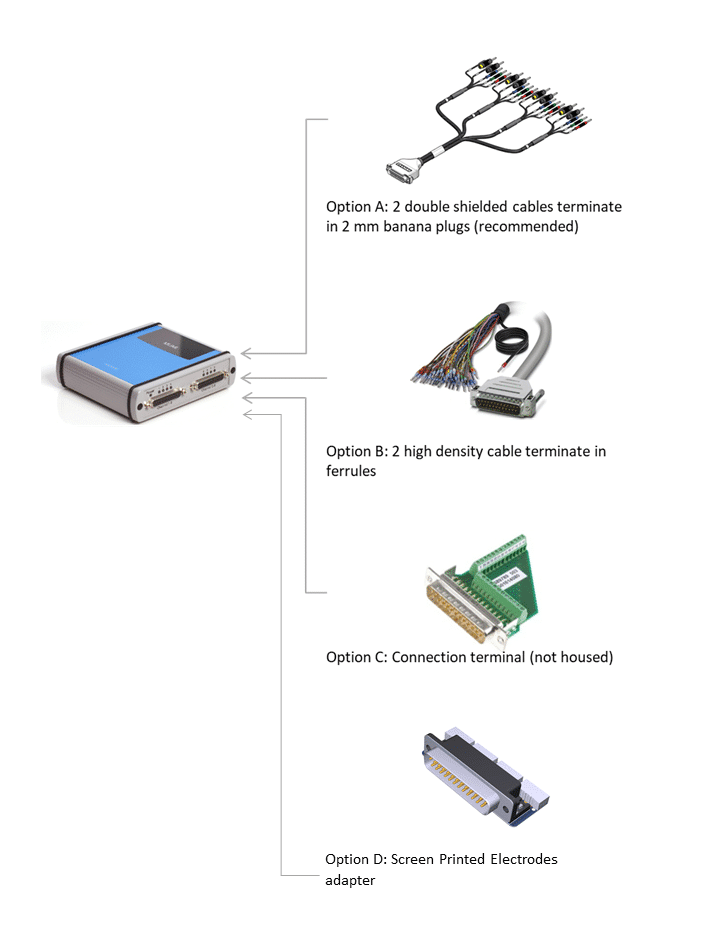
Specifications
System number of channels 8 (up to 128 when daisy chained) multiplexer switches 8 x (WE, S, RE and CE) on resistance for WE 1.5 ohm typical charge injection on WE 20 pC typical leakage current < 55 pA (30 pA typical) at 25 ºC switching time 2 ms compliance voltage
± 10 V Other housing aluminium: 138 mm x 121 mm x 37 mm weight +/- 500 g temperature range 0 ºC to + 50 ºC power supply USB The MUX8-R2 has the following connectors:
Connector Function Input Y-cable connects to both potentiostat sensor connector and (digital) AUX AUX Can be used to measure auxiliary input like temperature or pH, and to switch external hardware using two digital control lines that can be set in PSTrace Link Connects to Input of next multiplexer, for daisy-chaining multiple multiplexers USB-C Input for extra power when
≥3 multiplexers are daisy-chainedChannel 1-4 Connects to sensor cables 1-4 Channel 5-8 Connects to sensor cables 5-8 -
OE.D*.E** Oxygen Electrode
Read moreThe Oxygen electrode consists of a PEEK body, platinum electrode, silver reference electrode and membrane holder.
The platinum electrode is melted in glass. The membrane holder with electrolyte is attached by thread. Oxygen electrode (OE) is designed for measurements with thermostated cell TC4, TC5, TC6.
-
Offer of long-term automated measurements on BVT apparatus
Read moreSPE sensors work best in flow mode. For these purposes, the BVT laboratory is equipped with potentiostats, high-pressure pumps, peristaltic pumps, linear pumps, liquid switches and flow cells.
Measurement by FIA and DIA (Flow injection and Diffusion injection analysis) methods in connection with a microdialysis catheter.
We have a unique AUTOSAMPLER device (x-y-z robot) with a movable arm, allowing the movement of the measuring probe between up to 50 samples.Example of use:
- semi-continuous measurement by classic immersion of electrodes in samples
- continuous measurement in flow mode using the DIA and FIA methods
-
PalmSens4
Read moreThe PalmSens4, is a USB and battery powered Potentiostat, Galvanostat, and optional a Frequency Response Analyser (FRA) for Electrochemical Impedance Spectroscopy (EIS).
Compact, versatile and powerful
- (Bi)Potentiostat / Galvanostat / Impedance Analyzer
- FRA / EIS: 10 μHz up to 1 MHz
- 9 current ranges: 100 pA to 10 mA
- 18-bit resolution
- Bluetooth or USB connection
The PalmSens4 has a large potential range (-5V to 5V or -10V to 10V) and current range (100 pA to 10 mA) with a high resolution and low noise. The economical PalmSens4 is a complete laboratory instrument but its compact and rugged design makes it also ideal for field work.
Connecting via Bluetooth guarantees a perfectly floating measurement.
More information can be found through the link: https://www.palmsens.com/product/palmsens4/
Configurable
PalmSens4 comes in different configurations:
- ±5 V or ±10 V potential range
- EIS/FRA with maximum frequency of 100 kHz or 1 MHz
- optional BiPotentiostat module for second WE
- optional iR-Compensation
Standard included
- Rugged carrying case
- High quality, double shielded cell cable with
2 mm banana connectors for Working, Counter, Reference electrode and Ground - Crocodile clips
- Dummy cell
- USB cable
- Manual and Quick Start document
- PSTrace software for Windows
-
PE Paste Electrode
Read moreThe PEc consists of a PEEK body containing screw and piston with contact. The electrode itself is polyethylene tip profiled with paste.
The graphite paste is delivered as a standard electrode. Standard connection is with a 2 mm banana plug. Paste electrode (PEc) is designed for measurements with TC4, TC5 and TC6 glass cell. PEc is used for measurement of cyclic voltammetry and stripping voltammetry. The tip with paste is exchangeable.
-
pH Electrode Conic
Read morepHc Electrode are used as sensors for potentiometric determination of H+, respective H3O+ activity, expressed in pH units.
Conic electrodes are applicable to all commonly used measuring apparatus with inner resistance of 10^9 ohm or more.
Electrode is designed for measurements with TC4, TC5 and TC6 glass cell.
-
Pipette Round Base Stand
Read moreA custom BVT pipette stand with a round base, designed for storing a large number of glass pipettes. Made to be robust and long-lasting, for easy organization, storage and use.
The round stand contains 35 holes with a diameter of 11.38 mm and 14 holes with
a diameter of 7.89 mm.The stand is designed so that the lower round base of the stand can be separated from the stand for easy washing.

